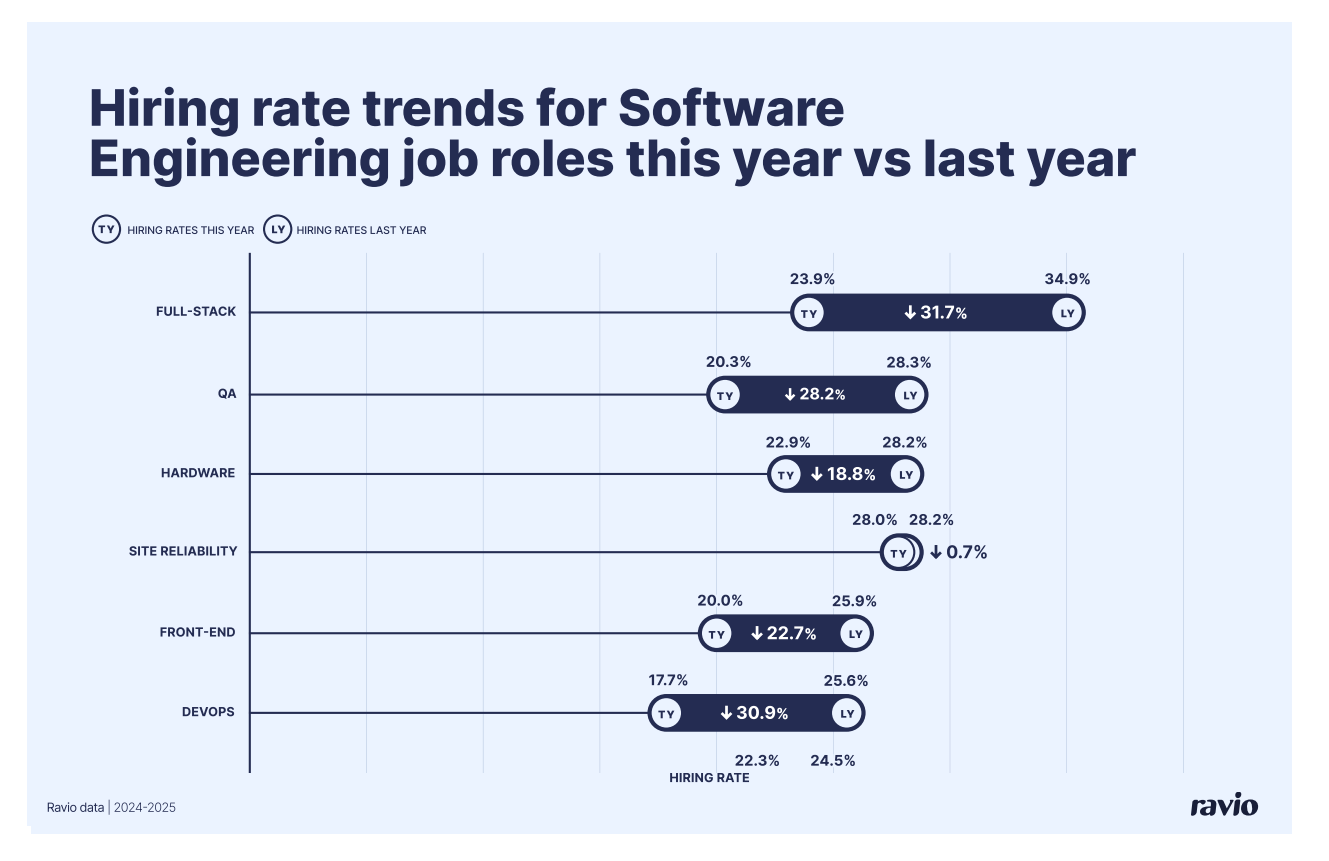
Everyone sees the layoffs. Nobody sees the shift underneath them. This week, I unpack why ghost job listings are flooding the market, why AI is accelerating a talent reset, and which roles will define the next decade of tech.
Exaltitude newsletter is packed with advice for navigating your engineering career journey successfully. Sign up to stay tuned!
For years, tech felt untouchable. Great salaries, flexible work, endless demand. Then, almost overnight, the ground shifted.
Hundreds of thousands of talented people were suddenly out of work. Teams were cut. Hiring pipelines froze. And just to add insult to injury, around 70 percent of recruiters admitted it's now “normal” to post fake job openings.
If you’ve been applying and hearing nothing, it’s not just you. It’s the market.
LinkedIn data shows that only 8 out of 100 applicants even get a response. That means most people don’t even get a rejection, just silence.
So, what changed? And is there a way back?
Let’s rewind.
The tech industry has always had seasons. Excitement, then panic. Hiring binges followed by mass cuts. It has never been smooth, but this latest wave has been especially brutal.
In the 90s, the internet was brand new. Money flooded in. Startups popped up in every spare office space. This was when I landed in San Francisco.

My sister worked at startups. I watched up close as investors threw money at anything with “.com” in it.
And the numbers backed the hype. From 1990 to 2000, tech jobs jumped 36 percent and salaries doubled. It felt like a rocket ship.
Then the bubble burst.
In 2001, everything crashed. My sister was laid off. Thousands lost their jobs. Tech employment dropped nearly 18 percent. It took years to claw back.
But tech always finds a way to reinvent itself. Smartphones came. Social media exploded. Cloud computing reshaped everything. By 2015, tech jobs had surged again, double the growth rate of the wider economy. Salaries soared above every other industry.
When I joined WhatsApp and later went through the Meta acquisition, it felt unstoppable. We opened offices.

We couldn’t hire fast enough. Every company was in the same race for talent.
Then the world shifted again.
The pandemic fast-forwarded the future. Everything moved online overnight. Remote work exploded. Companies hired like crazy.
Headcount became a corporate flex. It was a sign of “we’re winning.”
Until it wasn’t.
Starting in 2023, the correction hit hard. Amazon, Google, Meta, one by one, massive layoffs. Nearly half a million tech workers were cut across 2023, 2024, and early 2025.
Even people hired months earlier got the email.
Job postings fell off a cliff. According to Indeed, tech listings kept dropping through late 2023, and by 2025, they were roughly one-third below pre-pandemic levels.
The message was clear: the old market wasn't coming back.
The worst part wasn't just fewer openings. It was the illusion of opportunity.
Companies began posting roles they had zero intention of filling. Some did it to look like they were still growing. Some wanted résumés “just in case.” They called it building a pipeline. Candidates called it… nothing, because no one called them back.
Research suggests that over half of tech companies have posted at least one fake listing. Applications-to-interviews fell from 12 percent to about 8 percent. People spent months, sometimes years, applying into a void.
I’ve heard stories of people who completed multiple interviews only to be ghosted at the finish line.
No closure. No reply. Just silence.
Imagine going on three great dates and then hearing nothing ever again, except the date took you 40 hours, and you were trying to pay rent.
That’s the modern tech job hunt for many.
Here’s the hard truth: the tech job market isn’t dying. It’s transforming.
If you’re waiting for 2021 energy to return, free lunches, hyper-growth, recruiters begging you to apply, that era is gone. AI changed the trajectory.
AI isn’t just removing some roles, it’s creating entirely new ones. Titles with “AI” in them jumped more than 5x in two years. The U.S. government predicts tech employment will rise 18 percent over the next decade.
But that growth isn’t evenly spread.
High-skill roles are rising fast:
Meanwhile, traditional software engineering roles are shrinking. Full-stack down. Front-end down. QA down. DevOps down.

Not gone. But reduced. Re-shaped.
New graduates are feeling it most. Offers are down. Entry paths are tighter. Many are turning to freelance work or smaller startups.
The jobs didn’t disappear; they shifted lanes.
Companies no longer care just about degrees or fancy job titles. They want proof you can actually build things, ship things, solve real problems.
Portfolios. Projects. GitHub repos. Demos. Practical skills.
Specialization matters again:
Security. Automation. Cloud. Data. AI.
And quietly, a slow recovery is happening. Not loud. Not everywhere. But steady. Developers with AI skills are seeing nearly a 10 percent pay bump. Startups are hiring again, carefully. Some mid-sized firms are growing without press releases and hype.
The hiring market isn’t wide open, but it’s breathing again.
If you're in tech or trying to break in, here’s the mindset shift:
The door isn’t closed; it just changed shape.
The winners in this next chapter will be the ones who adapt fastest. The ones who learn new tools. Pick a specialty. Build real projects. Show real impact.
Tech isn’t dead. It’s evolving.
Mass hiring is out. Meaningful hiring is in.
The question isn't “How do I get back to the old tech world?”
It’s:
How do I build skills for the world that’s forming now?
This is a reset, and a chance to reinvent.
Exaltitude newsletter is packed with advice for navigating your engineering career journey successfully. Sign up to stay tuned!

Copyright @Exaltitude